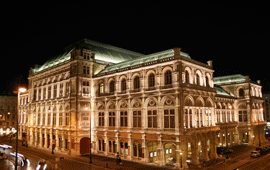> [Archived] Chronicles

The Vienna State Opera: DON CARLO - Chronicle
Stage director's vision
As a matter of fact, the stage direction does not bring novelties (except for the way the friendship between Don Carlo and Posa was presented - closer to mimics and teenage reactions and sometimes even playful) and the scenic image was reproduced using opening and closing panels that go very low to suggest the jail; they create the image of the garden (maybe the most beautiful) with the help of the blue light hardly visible trough the holes of the panel projected onto the floor. Everything was in grey shades, the sensation of a limited space (not only physical but also spiritual) became stronger due to the fact that the action took place in a sort of cube. Everything was intense remembering of the dark period of the Middle Age Spanish Inquisition, the almost omnipresent semi-obscurity was scarcely coloured by the well taught lights, sometimes even surprising, as in the "auto de fe" scene where the expected colour was fire red or (symbolically) blood red but on the contrary it was bright.
Among the few decor elements the candles in Filips' room are remarkable, creating a special atmosphere. The costumes are least successful, the king of Spain was dressed rather like … Napoleon, Don Carlo with a sort of frock coat, Rodrigo had a coat without sleeves closer to Wilhelm Tell and the dresses were simple and poorly cut, common, without personality while in the "auto de fe" scene the extras seemed to be from different ages and European areas, the dignitaries had common vestments and only the convicts were closer to the "truth".
Great names included in the cast
The cast was mighty at least as a list of great names, although during this performance Ramon Vargas (Don Carlo) had serious vocal problems, singing with difficulties the high notes and his character was left as usual at the level of accuracy on all aspects, Simon Keenlyside (Rodrigo) managed to create a genuine marquis, trustworthy comrade of Carlo, prestigious in the Filip sequences, he was sensible and had intelligent phrases during the final area, triggering a round of applause. While performing Philip II, base Rene Pape had amplitude, was imposing but still very human, his confrontation with the Grand Inquisitor had become a reference point because Eric Halfvarson once again managed to impress by his incredible voice, incisive and extensive, with great high notes and an attitude in accordance to it.
Debuting with the part of Elizabeth on the occasion of the premiere, soprano Krassimira Stoyanova proposed a more voluntary, perhaps even rebellious or at least outraged at the injustice and sorrows performance, her singing was extremely successful, assertion not valid in the case of mezzo-soprano Luciana D'Intino (Eboli). She was highly appreciated by the press although she did not convince me as a character and even less as a vocal singer because the differences at the register level were unpleasant, low-pitched during the "canzone" she interpreted with soprano Ileana Tonca (a charming Tebaldo) when she did not attract in any way and in the trio from "the garden" she was dull, however performing the area closer to the expectations.
Dan Paul Dumitrescu in Monk/Carlo V had a great performance, with his ample, round and generous voice, perfectly equal to all registers, bringing the required authority in both parts and managing to be an outstanding presence. During her short intervention soprano Valentina Naforniță strictly followed the lyrics although she lacked the purity and clarity of a "Celestial voice".
Similar to the orchestra, the choir had a good performance and the conductor Franz Welser-Most somehow controlled the generous development of the acts. He conducted with the precision of a metronome and the firmness of a true conductor who does not make concessions and who is not touched by the romanticism of the music and still there were some slight dissonances.
Conclusions
Overall it was a performance with great voices (both literally and figuratively speaking) well balanced but without the amplitude and the monumentality imagined by Verdi himself for his tough or heroic characters placed in an era where, at Escorial, at least in appearance, sobriety and grandeur were sovereigns.
Translated by Oana Marina Siliste
MTTLC, Bucharest University














